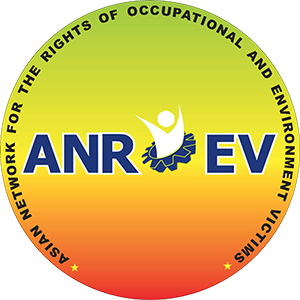About ANROEV
The Asian Network for the Rights Of Occupational and Environmental Victims (ANROEV) formerly known as the Asian Network for Rights of Occupational and Accident Victims (ANROAV)is a coalition of victims’ groups, trade unions and other labour groups across Asia, all committed to the rights of Victims and for overall improvement of health and safety at the workplace. The industrial disasters of Kader and Zhili, that killed more than 250 workers led to a campaign by the labour and victims groups in Asia towards better health and safety rights of the workers and the victims. ANROEV was formally constituted in 1997 and now has members from 14 Asian Countries and Territories including Japan, Korea, China, India, Pakistan, Thailand, Indonesia, Vietnam, Bangladesh, Hong Kong SAR, Taiwan, Nepal, Vietnam and Cambodia.
Why ANROEV?
ANROEV is a unique solidarity group, which works towards making Asian workplaces safe. Due to gross negligence of the OSH in the region the need to have a united front was essential. ANROEV combines the OSH rights struggle in different Asian countries into a one united struggle and demands better health and safety for the workers across the region. It also provides members a platform to:
- Share their experiences to the other members so that they can learn from it
- Share resources
- Share expertise
- Run joint campaigns
- Form a strong solidarity group in Asia and beyond Asia.
- Demand OSH rights of workers and victims in Asia.
- Strengthen the OSH movement in Asia.
Structure
ANROEV shall maintain a Central secretariat in Asia with one of the member organisation that shall act as the organisational and administrative centered for the ANROEV activities and programmes. ANROEV annual meeting (general body meeting) will elect 5 executive committee members among the members who will be responsible for the day to day functioning of the network. ANROEV will also have a regional advisory board that shall provide advisory services and supervision to the secretariat. ANROEV members and the advisory board will decide upon the location of the central secretariat.
Functions
- To strengthen the victims organisation in Asia and facilitate the formation of victims groups in countries where there are no such groups.
- Work towards the promotion of OSH as a fundamental right of workers to realise its recognition as a core issue at workplace, national, regional and international level.
- To help workers, trade unions, labour NGOs and other labour groups and activists (including victims’ groups) to develop their knowledge of OSH and to build their capacity to deal effectively with OSH-related issues.
- To carry out participatory research on OSH which can help in understanding the problems, identifying trends (related to cheap production and relocation of hazardous industries to Asia), relating workers’ accidents and sickness to the work they do and establishing strong worker participation in OSH issues as a basis for decision making.
- To facilitate the active participation of workers, trade unions and victims’ organisations in all forms of decision making related to OSH and to work towards the creation of an enabling environment or democratic institutions (like safety committees)
- To promote exchanges for education and use of resources for OSH among labour groups in the region.
- To promote more emphasis on overall occupational health that is neglected because most OSH programmes target accident prevention.
- To strengthen the network of organisations working on OSH in different locations to improve solidarity and sharing of knowledge and resources.
- To prepare easy-to-read publications aimed at demystifying the technical concepts and jargon-laden information about OSH and bargaining strategies for workers in simple, local languages.
- To advocate better OSH laws and policies and their effective implementation at all levels.
- To prepare a database of medical and legal experts in all countries and make it available to workers and labour organisations.
- To run joint campaigns and develop solidarity on common issues in the region.
- To work with all the groups involved in the health of workers and community.
- To campaign against ‘corporate irresponsibility’ at work and campaign, in collaboration with environmental groups, against unsafe workplaces those threaten workers and the surrounding community as a whole.
